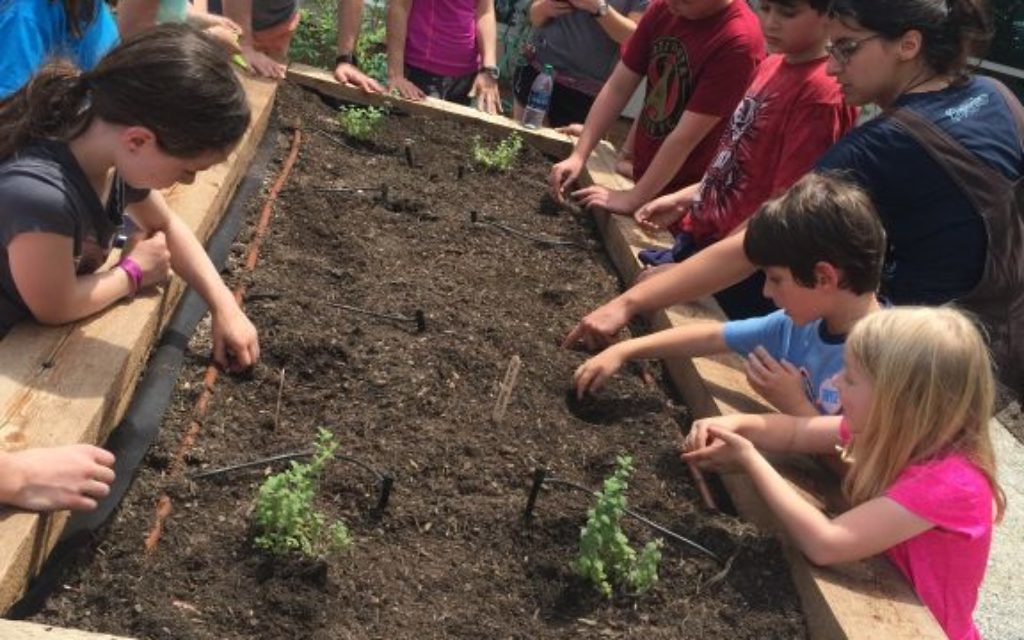Sustainable Agriculture Brings Jews Back to Roots
Learning how to prepare food from fresh ingredients is key to changing your relationship with food.
A few dedicated Jews in farm and gardening are making a difference in Atlanta as a grassroots organization known as the Jewish Farm and Food Alliance.
Composed of gardeners, chefs, farmers and social justice workers, the group aims to build a bridge between Jewish Atlanta and the sustainable farming movement.
It began as a few chefs who came to together to host a Christmas Eve farm-to-table Chinese buffet dinner at The Temple and grew into a loose organization holding must-attend events around the city.
Get The AJT Newsletter by email and never miss our top stories Free Sign Up
When Jonathan Tescher began JF&FA, he had worked in sustainable agriculture and local food for 10 years. He said he has many colleagues who also work in food and farming and share the same background.

“I looked around, and they were all Jewish,” Tescher said. “All my friends in the community are involved in social justice, and we’re interested in tikkun olam.”
The group includes professionals who volunteer at food banks, bring healthy food to underserved communities, create markets for small farmers and offer sustainable-agriculture education.
Tescher is managing a grant given to Clark Atlanta University to integrate technology into urban agriculture. He was inspired to bring his friends together to build a platform around sustainable agriculture and gardening.
He partnered with chefs such as Todd Ginsberg, Eli Kirshtein and Jarrett Stieber to host fun events that bring awareness to sustainable agriculture.
They have held two farm-to-table Chinese buffets at The Temple and a Sukkot dinner at Aluma Farm. Everyone volunteers the time to pull off the culinary events, which are labors of love.
Tescher said they couldn’t have done it the first two years without the help of Seth Freedman, the culinary director at PeachDish, a meal kit company that sources produce from local farmers.
Freedman, the point man for the Chinese dinners, said Jews are drawn to the movement because Judaism revolves around agriculture and food.
His upbringing and moral direction led Freedman down the path of seeking clean, honest and just food. Though he doesn’t keep kosher, Freedman cites kashrut as the preface to many of his food choices.
“You have Passover, which is deeply woven into food custom,” Freedman said. “Even on Shabbat I have a personal connection to my culture through the food on the table, like challah bread and the Kiddush wine. As a Jew, you’re automatically predisposed to recognize the importance of food in your life.”
Freedman was a chef at Bacchanalia, a restaurant that serves only farm-to-table entrees, and was the program director of Seeds of Nutrition, an experiential program that teaches children about food and eating through classroom activities involving sustainable agriculture and gardening.
“I feel very strongly the fundamental knowledge of learning how to prepare food for yourself from fresh ingredient is key to changing your relationship with food,” Freedman said. “The best place to start is with kids.”
As a part of Seeds of Nutrition, he led workshops for teachers on sustainable gardening. For Freedman, building a garden is more than planting tasty vegetables; it also involves planning.
Such planning is how JF&FA prepares the menus for its dinners, including the Sukkot dinner for 500 people in the fall.
Freedman uses the same system to create menus for PeachDish, where he keeps track of produce available during the season and plans meal according to each harvest. It’s a practice he said can be easily implemented on a smaller scale in the home.
“What grows together goes together,” Freedman said. “If you’re harvesting fresh tomatoes, you’re probably also harvesting squash, peppers and basil. Those ingredients can make a quick ratatouille or a primavera.”
Teaching people about gardening and sustainability is part of a larger movement, and Jewish Atlanta is ahead of a national trend, said Emily Blustein, the Hazon JOFEE fellow at the Jewish Federation of Greater Atlanta. She said it’s important to let people know anyone can garden.
“There’s a lot of ways for Jews to be a part of this movement. Growing your own food is possible. You can start by getting a couple of planters and plant tomatoes and peppers. You can also grow your own herbs,” Blustein said.
Blustein is assisting Atlanta nonprofit organizations with gardens and will be involved with the JF&FA Sukkot dinner. She is also working on the Marcus Jewish Community Center’s garden for its summer camp program and is helping with Senior Day on Monday, May 15, when participants at the JCC will plant a Havdalah spice garden.
Her work also includes showing synagogues and day schools how to integrate farm-to-table programming.
Being involved in Atlanta’s movement for sustainable agriculture is exciting for Blustein, who said it’s a way to bring Jews back to their roots.
“Our history is connected to agriculture. We were farmers and pioneers of agriculture. So much of our culture and history is connected to the land,” she said. “There’s a blessing for trees and a blessing for vegetables. It’s a way to connect more to Jewish spirituality.”







comments